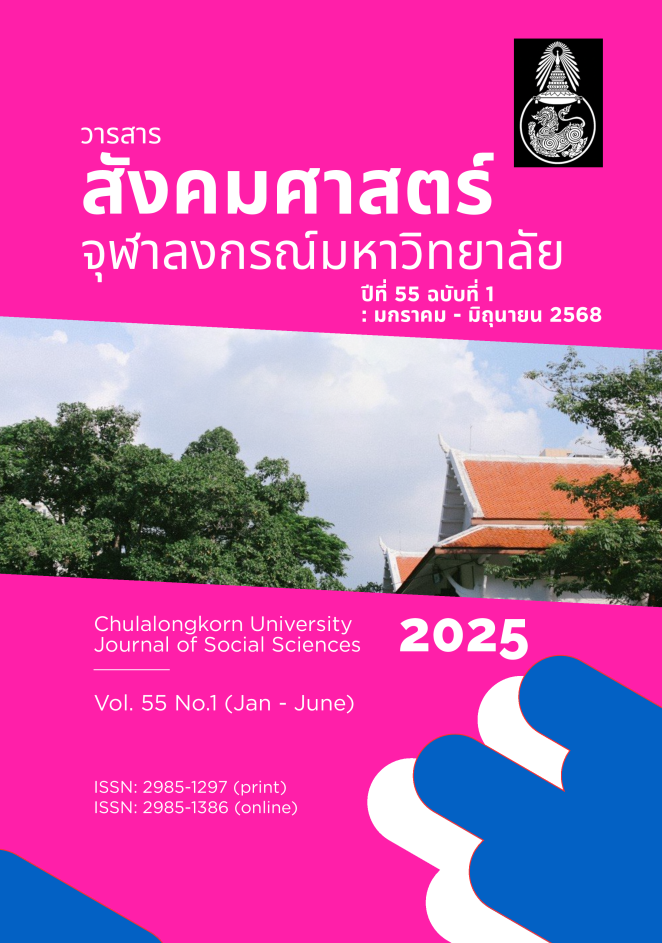วัฏจักรแห่งอำนาจกับวิถีทางการเมืองของชาวสิงคโปร์เชื้อสายอินเดีย ภายใต้นโยบายพหุวัฒนธรรม
DOI:
https://doi.org/10.61462/cujss.v55i1.3423คำสำคัญ:
อินเดียศึกษา, การเมืองการปกครองสิงคโปร์, สังคมพหุลักษณ์, พหุวัฒนธรรมนิยม, ลดความเหลื่อมล้ำบทคัดย่อ
บทความวิชาการนี้เป็นการศึกษาอิสระ ที่มีวัตถุประสงค์เพื่อศึกษาวิเคราะห์ชาวสิงคโปร์เชื้อสายอินเดียในฐานะชุมชนลำดับที่ 3 ภายใต้บริบทนโยบายพหุวัฒนธรรม โดยศึกษาบูรณาการด้านประวัติศาสตร์ สังคมวัฒนธรรม และรัฐศาสตร์ มุ่งพิจารณาถึงการเลือกตั้งทั่วไปกับการเลือกตั้งประธานาธิบดี ผลการศึกษาในครั้งนี้ได้แสดงให้เห็นว่า ก) สิงคโปร์เปิดพื้นที่เชิงอำนาจทางการเมืองการปกครอง เชื้อสายอินเดียได้เข้าถึงอำนาจฝ่ายนิติบัญญัติผ่านการเลือกตั้งทั่วไป ระบบกำหนดให้มีเขตเลือกตั้งแบบรายกลุ่มที่มีเชื้อสายอินเดียเป็นสมาชิก (ตั้งแต่ ค.ศ. 1988) ในปัจจุบันสังกัดอยู่ในทั้งฝ่ายรัฐบาลและฝ่ายค้าน แต่การสร้างกลุ่มที่มีเชื้อสายตามอุดมการณ์และดำเนินตามนโยบายก็เป็นเรื่องยาก ข) ชุมชนเชื้อสายอินเดียมีประวัติศาสตร์ที่ได้เข้าถึงตำแหน่งระดับสูงในฝ่ายรัฐบาล และการได้เข้าถึงตำแหน่งที่มีอำนาจสูงสุดห้าในหกตำแหน่ง นั่นคือ ประธานาธิบดี รัฐมนตรีอาวุโส รองนายกรัฐมนตรี หัวหน้าผู้พิพากษาสูงสุด และประธานรัฐสภา อย่างไรก็ดี ชาวสิงคโปร์เชื้อสายอินเดียยังไม่ได้เข้าถึงตำแหน่งนายกรัฐมนตรี ซึ่งเชื้อสายจีนมีจารีตสืบทอดในตำแหน่งนี้มาโดยตลอด
Downloads
เอกสารอ้างอิง
Ang, Ien, and Jon Stratton. 2018. “The Singapore Way of Multiculturalism: Western Concepts/Asian Cultures.” SOJOURN: Journal of Social Issues in Southeast Asia 33 (Special): S61–S86. https://muse.jhu.edu/article/711816
Chan, Sek Keong. 2013. “Multiculturalism in Singapore: The Way to a Harmonious Society.” Singapore Academy of Law Journal 25 (1): 84–109.
Doran, Charles F., and Edoardo Marcucci. 1990. “International Political Equilibrium in Power Cycle Theory.” International Political Science Review 11 (2): 133–146. https://doi.org/10.1177/019251219001100204
Elections Department Singapore. 2020. “Parliamentary General Election Results.” Accessed July 29, 2020. https://www.eld.gov.sg/elections_past_parliamentary.html
Elections Department Singapore. 2020. “Types of Electoral Divisions.” Accessed July 29, 2020. https://www.eld.gov.sg/elections_type_electoral.html
Government of Singapore. 2020. “Constitution of the Republic of Singapore.” Accessed July 29, 2020. https://sso.agc.gov.sg/Act/CONS1963
Government of Singapore. 2023. “Presidential Election Results.” Accessed June 14, 2025. https://www.eld.gov.sg/elections_past_results_presidential.html
Ho, Olivia, and Anjali Raguraman. 2020. “Singapore GE2020: Number of Indian MPs in Parliament Reflects Population Make-up, Says Shanmugam.” The Straits Times, July 4, 2020. Accessed July 29, 2020. https://www.straitstimes.com/politics/ge2020-number-of-indian-mps-in-parliament-reflects-population-make-up-says-shanmugam
Kymlicka, Will. 2012. Multiculturalism: Success, Failure, and the Future. Washington, DC: Migration Policy Institute.
Liu, Gretchen. 2014. Singapore: A Pictorial History, 1819–2000. 14th printing. Singapore: Didier Millet.
Mutalib, Hussin. 2002. “Constitutional-Electoral Reforms and Politics in Singapore.” Legislative Studies Quarterly 27 (4): 659–672. https://doi.org/10.3162/036298002X200765
Nasir, Heirwin Mohd. 2019. “Stamford Raffles’s Career and Contributions to Singapore.” Accessed July 29, 2020. https://www.nlb.gov.sg/main/article-detail?cmsuuid=3916c818-89dd-461b-9d45-81e27a08984a
Ortmann, Stephan. 2014. “The Significance of By-elections for Political Change in Singapore’s Authoritarian Regime.” Asian Survey 54 (4): 725–48. https://doi.org/10.1525/as.2014.54.4.725
Parliament of Singapore. 2020. “List of MPs by Parliament.” Accessed July 29, 2020. https://www.parliament.gov.sg/history/list-of-mps-by-parliament
Parliament of Singapore. 2023. “List of Former Speakers.” Accessed May 9, 2024. https://www.parliament.gov.sg/history/list-of-former-speakers
Pepe, Michael S., and Kaitlyn Krolik. 2017. “Using Power Cycle Theory and Role Realignment Theory to Recognize the International Roles of China and the United States.” International Journal of Business and Social Science 8 (4): 20–28.
Pillai, Anitha Devi. 2017. “From Kerala Mahajana Sangham to Singapore Malayalee Association.” Accessed July 29, 2020. https://www.malayalee.org.sg/about-history
Rocha, Zarine L. 2011. “Multiplicity within Singularity: Racial Categorization and Recognizing ‘Mixed Race’ in Singapore.” Journal of Current Southeast Asian Affairs 30 (3): 95–131. https://doi.org/10.1177/186810341103000304
Romero, Anna Maria. 2019. “‘Why Doesn’t the PAP Allow Tharman to Be PM?’ Netizens Speculate.” The Independent Singapore, June 19, 2019. Accessed July 29, 2020. http://theindependent.sg/why-doesnt-the-pap-allow-tharman-to-be-pm-netizens-speculate/
Singapore Department of Statistics. 2019. “Population Trends 2019.” Accessed July 29, 2020. https://www.singstat.gov.sg/-/media/files/publications/population/population2019.pdf
Singapore Elections. 2020. “Singapore Elections.” Accessed July 29, 2020. http://www.singapore-elections.com/
Singapore Parliament. 2020. “Members of Parliament.” Accessed July 29, 2020.https://www.parliament.gov.sg/about-us/structure/members-of-parliament
Singapore Parliament. 2020. “System of Government.” Accessed July 29, 2020.https://www.parliament.gov.sg/about-us/structure/system-of-government
Singapore, Public Service Division, Prime Minister’s Office, ed. 2015. “Cultivating a Harmonious Society, Becoming One People.” In Heart of Public Service. Singapore: Public Service Division, Prime Minister’s Office.
States Times Review. 2018. “Pritam Singh on Track to Be Singapore’s Next Prime Minister.” States Times Review, February 14, 2018. Accessed July 29, 2020. http://statestimesreview.com/2018/02/14/pritam-singh-on-track-to-be-singapores-next-prime-minister/
Ting, Wong Pei. 2019. “Older Generation of S’poreans Not Ready for Non-Chinese PM: Heng Swee Keat.” Today, March 29, 2019. Accessed July 29, 2020. https://www.todayonline.com/singapore/older-generation-singaporeans-not-ready-non-chinese-pm-heng-swee-keat
Velayutham, Selvaraj. 2017. “Races without Racism?: Everyday Race Relations in Singapore.” Identities 24 (4): 455–473. https://doi.org/10.1080/1070289X.2016.1200050
Visit Singapore. 2020. “The People of Singapore.” Accessed July 29, 2020. https://www.visitsingapore.com/about-singapore/the-people/
ดาวน์โหลด
เผยแพร่แล้ว
รูปแบบการอ้างอิง
ฉบับ
ประเภทบทความ
สัญญาอนุญาต
ลิขสิทธิ์ (c) 2025 คณะรัฐศาสตร์ จุฬาลงกรณ์มหาวิทยาลัย

อนุญาตภายใต้เงื่อนไข Creative Commons Attribution-NonCommercial-NoDerivatives 4.0 International License.
เงื่อนไขการอนุญาตสาธารณะ
นโยบายลิขสิทธิ์และการอนุญาต
วารสารสังคมศาสตร์ จุฬาลงกรณ์มหาวิทยาลัย เผยแพร่เนื้อหาทั้งหมดภายใต้ สัญญาอนุญาตครีเอทีฟคอมมอนส์แบบแสดงที่มา-ไม่ใช้เพื่อการค้า-ไม่ดัดแปลง 4.0 นานาชาติ (CC BY-NC-ND 4.0)
ลิขสิทธิ์
บทความทั้งหมดที่ตีพิมพ์ในวารสารสังคมศาสตร์ จุฬาลงกรณ์มหาวิทยาลัย เป็นลิขสิทธิ์ของ คณะรัฐศาสตร์ จุฬาลงกรณ์มหาวิทยาลัย ผู้เขียนจะโอนสิทธิ์ทั้งหมดให้แก่วารสารเมื่อบทความได้รับการตอบรับให้ตีพิมพ์
สัญญาอนุญาต CC BY-NC-ND 4.0
ภายใต้สัญญาอนุญาตนี้:
-
แสดงที่มา (BY): ผู้ใช้ต้องแสดงที่มาโดยอ้างอิงถึงผู้เขียน คณะรัฐศาสตร์ จุฬาลงกรณ์มหาวิทยาลัย และวารสารสังคมศาสตร์ จุฬาลงกรณ์มหาวิทยาลัย พร้อมทั้งให้ลิงก์ไปยังสัญญาอนุญาต และระบุหากมีการเปลี่ยนแปลง ทั้งนี้สามารถทำได้ในลักษณะที่สมเหตุสมผล แต่ต้องไม่ทำในลักษณะที่แสดงว่าผู้อนุญาตให้การรับรองผู้ใช้หรือการใช้งานดังกล่าว
-
ไม่ใช้เพื่อการค้า (NC): ผู้ใช้ไม่สามารถใช้เนื้อหาเพื่อวัตถุประสงค์ทางการค้า การใช้งานเชิงพาณิชย์จะต้องได้รับอนุญาตเป็นลายลักษณ์อักษรล่วงหน้าจากผู้เขียนและคณะรัฐศาสตร์ จุฬาลงกรณ์มหาวิทยาลัย
-
ไม่ดัดแปลง (ND): หากผู้ใช้นำเนื้อหาไปรวม ดัดแปลง หรือต่อยอด ผู้ใช้ไม่สามารถเผยแพร่งานที่ดัดแปลงนั้นได้ การดัดแปลงผลงานจะต้องได้รับอนุญาตเป็นลายลักษณ์อักษรล่วงหน้าจากผู้เขียนและคณะรัฐศาสตร์ จุฬาลงกรณ์มหาวิทยาลัย
นโยบายการเข้าถึงแบบเปิด
วารสารสังคมศาสตร์ จุฬาลงกรณ์มหาวิทยาลัย ให้การเข้าถึงเนื้อหาแบบเปิดโดยทันทีตามหลักการที่ว่าการทำให้งานวิจัยสามารถเข้าถึงได้อย่างเสรีแก่สาธารณะจะสนับสนุนการแลกเปลี่ยนความรู้ในระดับโลก ผู้ใช้สามารถอ่าน ดาวน์โหลด คัดลอก เผยแพร่ พิมพ์ ค้นหา หรือเชื่อมโยงไปยังเนื้อหาฉบับเต็มของบทความได้โดยไม่ต้องขออนุญาตล่วงหน้าจากผู้จัดพิมพ์หรือผู้เขียน ทั้งนี้เป็นไปตามสัญญาอนุญาต CC BY-NC-ND 4.0
นโยบายการเก็บบันทึกด้วยตนเอง
ผู้เขียนสามารถเก็บบันทึกบทความฉบับตีพิมพ์สุดท้าย ต้นฉบับที่ส่ง (preprint) หรือฉบับที่ผ่านการประเมิน (postprint) ในคลังสถาบันหรือเว็บไซต์ส่วนตัวได้ โดยต้องมีการอ้างอิงการตีพิมพ์ครั้งแรกในวารสารสังคมศาสตร์ จุฬาลงกรณ์มหาวิทยาลัย พร้อมระบุแหล่งอ้างอิงที่สมบูรณ์และลิงก์ไปยังเว็บไซต์ของวารสาร
การขออนุญาต
สำหรับการใช้งานนอกเหนือจากที่ครอบคลุมโดยสัญญาอนุญาต CC BY-NC-ND 4.0 กรุณาติดต่อ:
กองบรรณาธิการ
วารสารสังคมศาสตร์ จุฬาลงกรณ์มหาวิทยาลัย
คณะรัฐศาสตร์ จุฬาลงกรณ์มหาวิทยาลัย
Email: cusocscij@gmail.com
สำหรับข้อมูลเพิ่มเติมเกี่ยวกับสัญญาอนุญาตครีเอทีฟคอมมอนส์แบบแสดงที่มา-ไม่ใช้เพื่อการค้า-ไม่ดัดแปลง 4.0 นานาชาติ กรุณาเยี่ยมชม: https://creativecommons.org/licenses/by-nc-nd/4.0/deed.th





